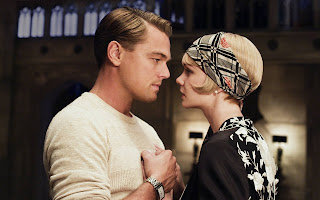Thursday, June 6, 2013
The Great Gatsby Review
Baz Luhrmann directing Leonardo DiCaprio and Carey Mulligan in an adaptation of F. Scott Fitzgerald's classic The Great Gatsby should have been a perfect setup. It could have been a beautiful film that told a heartfelt love story while also functioning as a criticism of the extravagant lifestyle of the young and rich. Instead, we got a music video set in the 20s.
Fitzgerald's novel tells the story of Jay Gatsby from the point of view of his friend Nick Carroway. Gatsby is a self made rich man, who throws wild parties in the hopes of attracting the attention of the woman he loves, who is now married to another rich man.
The film tells the same story, although it would be understood if you did not realize this. Baz Luhrmann seems to have little to no interest in telling the story, instead using it as a framing device to get to his next party scene. These party sequences are colorful, energetic and an interesting blend of modern and retro. This style could be forgiven, if it weren't for the fact that it is kept for the entire film. Even some of the darker scenes that show up towards the end of the story are shot and edited as though they are a party, removing any and all emotional impact that could otherwise have been achieved.
In fact, the film itself is almost entirely devoid of emotion. There is one scene that depicts the reuniting of Gatsby and Daisy in which you can feel the love and the chemistry. This is because Luhrmann wisely tones his directing down and lets the actors perform against each other. Unfortunately, this only lasts a moment before Luhrmann is back to overdirecting every frame of the film.
The actors could do well with the material if they weren't constantly being overshadowed by the costumes and scenery. It is impossible to connect to the story when the characters aren't given a chance to develop. Baz Luhrmann does not seem to realize that the visuals are supposed to service and enhance the story, not the other way around.
So how are the technical and artistic aspects of the film? The sets and costumes are so over the top that they pass through "pretty" straight into "gaudy." The cinematography tries way to hard to be unique and winds up just never really fitting in. The editing is extremely impatient, unwilling to remain on almost any shot for more than a few seconds. And the overuse of CGI is absolutely atrocious.
The music deserves it's own special recognition though. Jay-Z is an executive producer on the film, which is the only possible reason I can think of for why the soundtrack is filled with his songs. There is no artistic reason that makes any sense, as the music does not fit the setting, story or tone in any way, shape or form. It truly is marvelous just how much it takes the audience out of the film. I simply fail to see how the idea of using this music even got off the drawing board, much less into the final product.
What is truly disappointing though is that Luhrmann completely misses the point of those party scenes he loves so much. In Fitzgerald's novel, they function as a critique of the materialism in rich society. He meant to point out the futility and dissatisfaction of this extravagant lifestyle. Baz Luhrmann seems to be inviting you to the party.
Grade: D+
Subscribe to:
Post Comments (Atom)

No comments:
Post a Comment